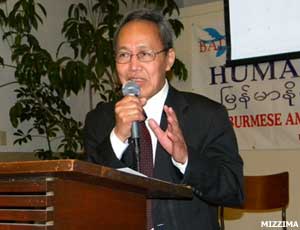Chiang Mai (Mizzima) – In response to the National League for Democracy’s (NLD) decision to re-register as a political party, many dissident organizations in foreign countries are reassessing their strategies and redefining their missions.

Among the organizations are the NLD – Liberated Area; the National Coalition Government of the Union of Burma (NCGUB); Members of Parliament Union – Burma (MPU) and the National Council of the Union of Burma.
The NCGUB includes five former MPs from the1990 general election and is led by Dr. Sein Win, the prime minister of the Burmese government in exile, who is Aung San Suu Kyi’s cousin. After a meeting last week, the NCGUB decided that the word “Government” in its name is no longer appropriate.
Dr. Tint Swe, the information minister of the Burmese government in exile, told Mizzima, “If Aung San Suu Kyi and the NLD legally enter parliamentary politics, ‘NCGUB’, the name of our organization, will not be appropriate anymore.”
However, he said he still had reservations about the current government because a military government ruled Burma for so many years. The group would continue to fight for human rights, peace in ethnic areas and work for the freedom of political prisoners, he said.
The NCGUB was formed in December 1990. Tint Swe said the Norwegian government supports the group and it will continue to support its involvement in Burmese politics.
The MUP, formed 15 years ago, will continue in its current form, said Tint Swe who also serves as an MPU member. The MPU comprises 32 MPs elected in the never-honoured 1990 general election.
One significant change, he said, is that “the demand to convene the parliament in accord with the results of 1990 general election does not exist anymore. But, the electoral results and the support of Burmese citizens will be milestones in our history.”
The MPU MPs represented the National Democracy Party, from Chin, Shan, Arakan, Mon, Lahu, Zomi parties, and independent MPs.
An official of the NLD-LA Foreign Affairs sub-committee said a central executive meeting last week decided to drop the name “NLD-LA” because it is tied to the 1990 general election.
“The NLD-LA may be transformed into NLD groups based in foreign countries. Eight branches of NLD-LA now exists in the U.S., Japan, Australia, Canada, Malaysia, South Korea, Norway and England.
The NLD-LA would work for reconciliation between the government and opposition groups, including ethnic armed groups, he said.
“We helped to hold the dialogue between the Minister Aung Min and ethnic groups. NLD-LA will be involved in seeking national reconciliation and working for the development of the country,” he said.
Both the NLD-LA and MPU, along with Democratic Alliance of Burma and the National Democratic Front, are member groups of the NCUB.
Aung Moe Zaw, the NCUB joint secretary No.1 and chairman of the Democratic Party for New Society, said that whether the member groups will continue as members of the NCUB has yet to be decided.
“The NCUB needs to review its activities and structure, I think. Meetings between chairmen and secretaries of member groups need to be conducted as soon as possible. Most of our activities are related to the results of 1990 general election so we need to review whether our activities are in line with the current situation,” Aung Moe Zaw said.
The NCUB was formed in September 1992 and it incudes 26 pro-democracy organizations.


